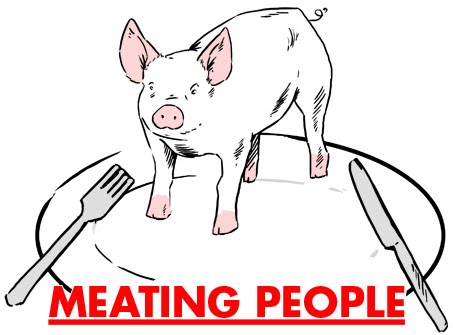 If you live in the Brunswick area, and you frequent Barkly Square (or Sparkly Bear, as we’ve taken to calling it) Shopping Centre, you’ve probably seen me. I’m the guy standing in front of the rows and rows of food at Coles trying to work out what politically correct impulse to pay lip service to.
If you live in the Brunswick area, and you frequent Barkly Square (or Sparkly Bear, as we’ve taken to calling it) Shopping Centre, you’ve probably seen me. I’m the guy standing in front of the rows and rows of food at Coles trying to work out what politically correct impulse to pay lip service to.Okay, before I get ahead of myself, I should probably take a leaf out of Kim’s book and introduce myself. That guy, standing in the aisle, that’s me: I’m Wes Mountain. I work a boring day job, where I ostensibly tell people what they do wrong in their job for cash money. I should note that it’s not big cash money, heck it’s not even cash. It’s a salary. I am also in a band called Little Bones, and draw a political cartoon blog called Dickhead Frenzy. I draw a lot, actually, and I’m sure that’ll creep into this blog at some stage.
So anyway, back to the topic at heart. I too recently read Jonathan Safran Foer’s Eating Animals. I thoroughly enjoyed it; at least to the extent one can enjoy being told uncomfortable truths about their eating practices. While I found it very informative, I think it suffered with the same condition a lot of seemingly universal modern texts suffer from – it was very US-centric.
Australia, much as we like to pretend otherwise, is not America. We’re a much smaller country. Things like free-range eggs, chicken and pork-products (bacon, ham etc.) are much more readily available in Australia than in the US. Our relatively small population, and particular penchant for the coast, means that the distance from the agricultural process to the plate is much shorter, both literally and figuratively. As far as I’m aware, our animal welfare standards are much stricter, and regulation of the environmental impacts of meat production, as well as the use of hormones and antibiotics in farmed animals, is government audited.
But it’s that qualifier, “as far as I’m aware,” that worries me. I mean I hear all of these good things, and until recently (I’m getting better) I’ve paid lip service to the process of improvement by only buying free-range eggs and mostly buying free-range ham, but what about the uncomfortable things people occasionally say about our supposedly ethical Australian meat industry?
Things like how there’s apparently not enough free range eggs to service the Australian population at our current rate of consumption, or that the amount of eggs labelled “free range” can’t possibly all be “free range” given the small amount of farms producing said eggs. Or the fact that “free range” itself is a term that can be self-appointed, and that the RSPCA or industry funded groups are the only organisations that provide accreditation (and, like the Heart Foundation, they both seem to have commercial interests in who they grant accreditation to). Or the idea that, despite the fact that on paper beef seems to be relatively fine to eat, I can’t seem to find much information in lay-terms about ethical standards for the beef industry in Australia.
I don’t think vegetarianism is a viable option. I don’t begrudge vegetarians their position, but I think that for most people their argument doesn’t hold water. I include myself in this. Humans evolved to eat meat, and despite the fact it can be healthy to live without meat, we are fundamentally built to be omnivores. There are nutrients available in meat that are not found in equal, accessible abundance in any other (edible) form. I also don’t believe that one person wholesale removing themselves from the machinations of a colossal industry is going to do anything to better animal welfare in meat production, nor close the industry down.
On the flip side, I think there’re few things worse than a squeamish meat eater. If you can’t hack the idea of watching an animal being slaughtered, bled, skinned and butchered, I don’t know if you’ve earned the right to eat that meat. You don’t need to be a part of the process, but you need to be aware of it, and comfortable with its implications.
So that’s why I’m here. I want to be comfortable, ethically, with what I’m eating. I don’t think anyone should ever be in a position where they can look at their plate and not be able to answer where their meat came from, or what ethical compromises they are making to eat said meat.
I want to know that what I’m eating is ethically produced and, ideally, sustainable. I also want to support businesses that support my decision. Kim and I will use this blog to investigate options, hopefully answer some big questions around meat production and slaughter in Australia (I’m looking forward to visiting a farm too, Kim), and point you in the direction of restaurants, butchers and grocers, who can fulfil our needs. Maybe we can come up with some recipes too? I think that could be good. Add that to the list.
I don’t want to be that guy paying lip service to some vague idea of free range anymore.
So, let’s see if we can do this thing.

No comments:
Post a Comment